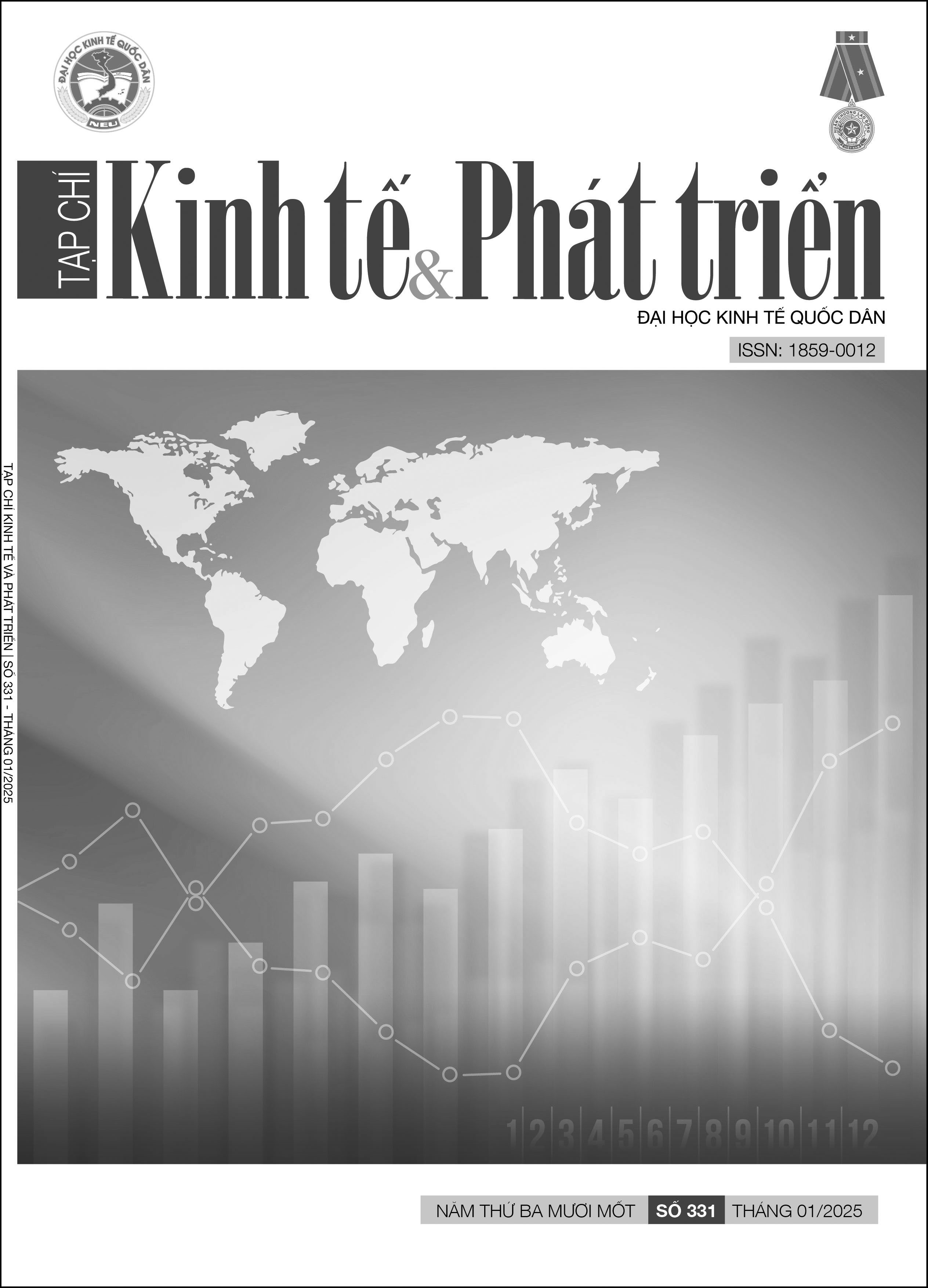Quản lý rủi ro biến đổi khí hậu trong hoạt động tín dụng tại các ngân hàng thương mại Việt Nam
DOI:
https://doi.org/10.33301/JED.VI.2014Từ khóa:
rủi ro liên quan đến khí hậu và môi trường, phân tích nội dung, rủi ro tín dụng, phân tích chủ đề, quản lý rủi ro biến đổi khí hậuTóm tắt
Nghiên cứu này tìm hiểu quản lý rủi ro biến đổi khí hậu trong hoạt động tín dụng tại các ngân hàng thương mại Việt Nam. Phân tích nội dung và phân tích chủ đề được sử dụng để xem xét các báo cáo hàng năm của 23 ngân hàng thương mại Việt Nam từ 2019-2023. Kết quả nghiên cứu cho thấy hoạt động tín dụng của ngân hàng thương mại Việt Nam chưa phản ánh đầy đủ rủi ro biến đổi khí hậu. 70% ngân hàng thương mại được nghiên cứu đã ban hành quy định quản lý rủi ro môi trường và xã hội trong hoạt động cấp tín dụng. Quản lý rủi ro liên quan đến khí hậu và môi trường đang được các ngân hàng thương mại tiếp cận từ trách nhiệm xã hội. Các ngân hàng thương mại cũng chưa quan tâm đầy đủ đến rủi ro biến đổi khí hậu ở cả tác nhân rủi ro vật chất và rủi ro chuyển đổi. Việc đo lường và đánh giá rủi ro biến đổi khí hậu trong hoạt động tín dụng một cách tổng thể cũng chưa được thực hiện.
Tài liệu tham khảo
Bathiany, S., V. Dakos, M. Scheffer & T. M. Lenton (2018), ‘Climate models predict increasing temperature variability in poor countries’, Science Advances, 4(5), eaar5809, DOI:10.1126/sciadv.aar5809.
Beltran, D. O., Bensen, H., Kvien, A., McDevitt, E., Sanz, M. V. & Uysal, P. (2023), What are large global banks doing about climate change? International Finance Discussion Papers, 1368, Washington: Board of Governors of the Federal Reserve System, accessed on 21/09/2024, DOI: 10.17016/IFDP.2023.1368.
Bennett, R. (2022), ‘Analysing climate risk in the banking sector: To what extent should the onus be on banks to fund the ‘green deal’ while focusing on their own climate change and ESG risk profile?’, Journal of Risk Management in Financial Institutions, 15(4), 406-417,
BIS [Bank for International Settlements] (2021), Climate-related risk drivers and their transmission channels, accessed on 21/09/2024, https://www.bis.org/bcbs/publ/d517.pdf
Coleton, A., Font Brucart, M., Gutiérrez, P., Le Tennier, P. & Moor, C. (2020), Sustainable finance - Market practices, EBA Staff Paper Series, 6, accessed on 21/09/2024, https://www.eba.europa.eu/sites/default/files/document_library/Sustainable%20finance%20Market%20practices.pdf
Degryse, H., Goncharenko, R., Theunisz, C., & Vadazs, T., 2023, ‘When green meets green’, Journal of Corporate Finance, 78, 102355, DOI: 10.2139/ssrn.3724237.
Deryugina, T. & Hsiang, S. M. (2014), Does the environment still matter? Daily temperature and income in the United States, NBER Working Paper No. 20750, accessed on 21/09/2024, https://www.nber.org/system/files/working_papers/w20750/w20750.pdf
ECB [European Central Bank] (2020), Guide on climate-related and environmental risks, Supervisory expectations relating to risk management and disclosure. European Central Bank, accessed on 21/09/2024, https://www.bankingsupervision.europa.eu/ecb/pub/pdf/ssm.202011finalguideonclimate-relatedandenvironmentalrisks~58213f6564.en.pdf
Greenwood, N., & Warren, P. (2022), ‘The role of climate finance beyond renewables: Behavioural insights’, International Journal of Climate Change Strategies and Management, 14(3), 272-292, DOI: 10.1002/jid.3656.
Hakim, C. (2000), Research design: Successful designs for social and economic research, 2nd ed., Routledge, London.
Javadi, S. & Masum, A. (2021), ‘The impact of climate change on the cost of bank loans’, Journal of Corporate Finance, 69, 102019, DOI: 10.1016/j.jcorpfin.2021.102019.
Jose, A. & Lee, S.M. (2007), ‘Environmental reporting of global corporations: a content analysis based on website disclosures’, Journal of Business Ethics, 72, 307–321, DOI: 10.1007/s10551-006-9172-8.
Kletter, A.,Clarke, T., & Boersma, M. (2014), ‘The governance of corporate sustainability: empirical insights into the development, leadership and implementation of responsible business strategy’, Journal of Business Ethics, 122 (1), 145-165, DOI: 10.1007/s10551-013-1750-y.
Lautenschläger, S. (2019), Central bankers, supervisors and climate-related risks, Panel Remarks-Network for Greening the Financial System Conference, France, accessed on 21/09/2024, https://www.bis.org/review/r190429i.pdf
Monnin, P. (2018), Integrating climate risks into credit risk assessment. Current methodologies and the case of central banks corporate bond purchases, Discussion Note 2018/4, CEP council on economic policies, accessed on 21/09/2024, https://www.cepweb.org/wp-content/uploads/2019/02/CEP-DN-Integrating-climate-risks-into-credit-risk-analysis.pdf
Pigato, M., (2019), Fiscal policies for development and climate action, World Bank Group, Washington, D.C., accessed on 21/09/2024, https://www.worldbank.org/en/topic/macroeconomics/publication/fiscal-policies-for-development-and-climate-action.
Santos, A. L. & Rodrigues, L. L. (2021), ‘Banks and climate-related information: The Case of Portugal’, Sustainability,13, 12215.
Stanton, P. & Stanton, J. (2002), ‘Corporate annual reports: research perspectives used’, Accounting, Auditing and Accountability Journal, 15(4), 478-500.
TFCF [Task Force on Climate-related Financial Disclosures] (2017), Recommendations of the TCFD disclosures, accessed on 21/09/2024, https://assets.bbhub.io/company/sites/60/2020/10/FINAL-2017-TCFD-Report-11052018.pdf
Vaismoradi, M., Turunen, H. & Bondas, T. (2013), ‘Content analysis and thematic analysis: implications for conducting a qualitative descriptive study’, Nursing and Health Sciences, 15 (3), 398-405.





